The war in Ukraine has had a devastating effect on both the environment and human health, according to a new report from the Organization for Economic Co-operation and Development (OECD).
The report warns that the conflict has caused “widespread and severe damage” to the environment, including the destruction of critical infrastructure and the contamination of land and water supplies. In addition, the report notes that the war has had “immediate and longer-term consequences on human health”, including an increase in mental health problems and exposure to dangerous chemicals and pollutants.

While Ukraine must focus on eliminating risks in the short term, the OECD says that there is potential for a “green recovery” post-war. The organization urges authorities to harness the experience and knowledge of local communities to develop sustainable plans for rebuilding infrastructure and restoring natural systems. With careful planning, the OECD believes that Ukraine has the opportunity to emerge from this conflict stronger and more resilient than before.
Environmental damage in Ukraine
Russia’s invasion of Ukraine has set back the progress that Ukraine was making on environmental challenges before the war, according to a new report from the OECD. The report, which was released today, paints a grim picture of the state of Ukraine’s environment in the wake of the conflict. Shelling has caused widespread and severe damage to Ukraine’s forests and land and marine ecosystems, alongside industrial facilities, transport infrastructure and houses. The water, sanitation and waste management infrastructure has also been impacted. The result is “immediate and longer-term consequences for human health and ecosystems,” the OECD says. The agency urges all parties to the conflict to take measures to minimize the environmental damage, and calls on the international community to provide assistance to help Ukraine recover from the devastating impact of the war.
Military waste in Ukraine
According to the OECD, Ukraine has seen levels of waste “dramatically” increase because of military operations. This includes military vehicles and equipment that are damaged or abandoned, shell fragments, civilian vehicles and building debris. There is also uncollected household and medical waste. Some of this waste is toxic and will need special handling, transport and disposal, says the OECD. For example, medical waste and shell fragments. Building debris can also contain toxic substances like asbestos – a fibre-like mineral that can damage the lungs – and heavy metals like lead and mercury, which are linked to multiple health risks. The OECD recommends that Ukraine develops a national strategy for dealing with this waste, as well as strengthening its legislation and regulations in this area. They also call for better coordination between different government agencies, and more public awareness about the issue.
Toxic Weaponry
The presence of large amounts of abandoned or damaged ammunition in Ukraine poses a significant risk to public health and the environment. These stockpiles leak hazardous substances into the soil, affecting surface and groundwater quality. Substances of concern include heavy metals used in munitions, explosive compounds and propellants from missiles and rockets. The OECD has warned that the large number of military vehicles containing these materials would require careful handling during collection and disposal. In addition, the Organization for Security and Co-operation in Europe has noted that the deterioration of these materials presents a significant fire hazard. Given the potentially severe consequences of these risks, it is vital that immediate action is taken to address this problem.
Long Term Solutions for Ukraine
The OECD’s report on Ukraine’s post-war reconstruction emphasizes the importance of using this opportunity to “fundamentally transform” the country towards a green, carbon-neutral economy. It notes that Ukraine will need environmental protection policies, regulations and standards to guide this transformation, and that sustainable finance for reconstruction should be geared towards achieving green objectives. The report’s recommendations provide a clear roadmap for how Ukraine can use its post-war reconstruction to build a more sustainable future.
